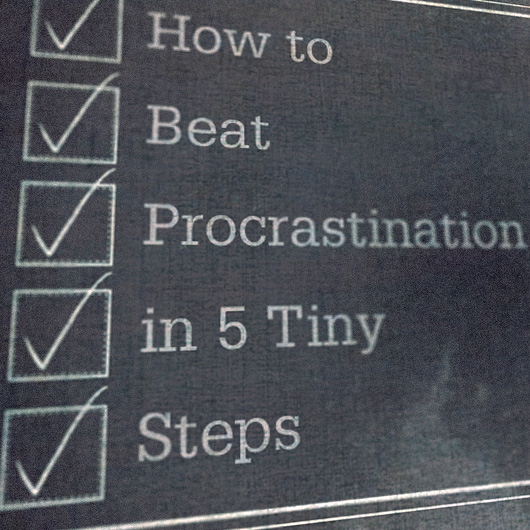The idea that we can beat procrastination through sheer will power – by clenching our teeth and forcing our way into self-discipline – is a myth which has been busted a long time ago. The real path to self-discipline can't be further from this misguided popular perception.
Getting self-disciplined is more akin to debugging a computer program really. It requires deconstructing functional parts of the program and run through its lines of code until some flaw is identified such as a wrong assumption, a broken logical argument or wrong syntax.
If the analogy to computer language may sound a little bit geeky to you, just bear with me a little while. The short end of it is that becoming self-disciplined isn't something you need to add but rather something you need to spot, tweak or let go of. Procrastination has a lot to do with our general attitude towards life, nourished by deep rooted habits and subconscious fears and beliefs. This is what makes our program so to speak.
The biggest cause of failure when trying to beat procrastination is approaching it as a whole instead of breaking it down into identifiable sources we can act upon one go at a time. So let's start some program debugging.
Common bugs to be aware of:
Negative Self-talk
We talk to ourselves all the time. No not in the loony kind of way but rather as mental chatter and blabbing. Thoughts may seem transient and trivial compared to our actions but nothing can be further from the truth. The fact is that our subconscious mind acts upon our mental declarations even if we are unaware of it most of the time. The unfortunate thing is that a lot of our self-talk is not that constructive. “I'm such an idiot! How on earth didn't I see that coming?” or “That job is way beyond my skills” or “It's quite improbable I succeed at this“…you get the drift.
These negative thoughts are like commands for our subconscious mind to act upon. If you think something is not achievable, it will not be. If you throw negative criticism at yourself all the time, it makes it harder to move forward. So in a way, negative self-talk immobilizes you from making a positive change or reaching a goal even if the goal is a simple mundane one such as polishing your CV.
Fear of Failure
This is a no brainer. It's common to be afraid of failing to do or achieve something even if the failure is nowhere near a catastrophe. Fear of failure is a deep rooted bug in our program which creates friction and inertia. It ends up holding us back from trying out a new adventure or follow a new prospect. Again, we might not be aware of it happening. It kind of lurks in the background but the end result is that it makes us decline or postpone a particular task.
Fear of Success
This might sound counterintuitive to some but actually it stinks as bad as fear of failure. To put it simply, fear of success is the fear of not being able to handle the successful outcome of a change. It can be hard to admit it (if you are conscious of it that is) and one might shake it off with some ‘rational' excuse of some sort. Yet fear of success takes you to the same point that fear of failure does: inaction.
General Paranoia
The word may sound a bit strong but paranoia also comes in mild flavors and colors. In a nutshell it is the belief that the ‘universe' is conspiring against you and creating obstacles along your way. It is also the irrational belief that things might go wrong or turn out the wrong way. The belief can be very subtle and hard to identify yet it can seep through and cascade down our everyday doing. The net effect is that it debilitates us from taking action since we perceive the goal post further from its real mark.
5 Tiny Steps to Program Debugging:
Early detection & warning: You might be thinking how can the subconscious fears and ‘bugs' in our belief system mentioned above have direct effect on deferring a task on your to-do list? The thing is that they play a great part in it mostly because they are ‘subconscious programs' running in the background and which we are unaware of. Any subconscious self-sabotage will lose its grip on us if we become conscious of it. In other words, we have to nip it in the bud while it's happening.
So for instance, next time you are dragging your feet on doing something, take a minute for some internal inspection. Try to honestly ask yourself where the source of your excuse is. Maybe the immediate answer is that you don't feel like it or that it is not a top priority but just by digging a bit deeper one of those bugs mentioned above will probably be revealed. Once faced, their power diminishes. This is not ‘wishy washy talk’ but the way our mind works.
Changing commands in the script: One of the bugs I mentioned is negative self-talk. The good news is that its opposite – positive self-talk – has also subconscious effect on us. Not surprisingly then, we can use positive self-talk as a counter-measure. This involves some practice and habit-forming initially until it starts flowing more naturally.
So once you detect and identify one of the bugs mentioned above, you can consciously re-direct self-talk in a positive direction. Thoughts like “I can do this like I have many times before” is a simple example. You might perceive this as wishful thinking but if negative self-talk can affect your behavior then it is just as true that positive thinking does too. Some people refer to this as ‘affirmations'. Affirmations are in essence mental declarations or commands for our subconscious mind to act upon. There is nothing otherworldly about them.
Keeping a change log: When either programming or debugging, it is very easy to lose track of changes. That is why logs are kept so one can make reference to them to view the change history. When you lose track of progress, you lose track of the whole plan to move forward. So when you have succeeded in debunking one of those subconscious fears or beliefs, make a mental note of it otherwise next time around it would be like resetting to the beginning.
Running a test: When you have started making some progress, even if a tiny one, you can allow yourself to apply that change. You don't need to wait until all steps are achieved or until the success is big enough. This would otherwise stall your progress by losing interest quickly. Steps have to be small enough to be manageable.
So if you have just started spotting those subconscious fears, feel free to use them the next time you notice you are procrastinating about something. Maybe it will not be enough at first. But so what? It will give you the opportunity to actively test your tweaks and changes as you go along.
Keeping the goals simple: When debugging the program, you need to keep the goals simple. Although the ultimate goal is to fix the program as a whole, you progress through tiny steps at a time. When we force the ‘all or nothing' attitude towards goal-setting it is bound to fail. The trick is to accept failure and know that it is ok if things do not run perfectly smooth. This is why the previous two steps are essential for success. We have to accept that things can be rough and bumpy.
Personally for me, my biggest source of procrastination was this ‘perfect or nothing' attitude. Learning to be ok with launching things before they are perfect helped me a lot. I used to imagine a perfect outcome in my mind – for example a perfect public speech or a perfect report – but perfect is impossible and I used to tire and bore myself out before actually completing it.
So what's more important for productivity – getting less than perfect things done or keeping perfect ideas undone?
End comments
Beating procrastination is not only about productivity and getting things done but about a positive life-change. Since the ‘program debugging' requires us to keep aware of our inner motivations while keeping positive ‘internal conversations', the result is nothing short of life-changing. Slowly you will realize that you are not only stopping yourself from procrastinating and getting more things done but you have reprogrammed your mental disposition to life – an essential ingredient in personal growth and maturity.
Beating procrastination through simple manageable steps brings forth other benefits too. Keeping your to-do list clean not only unblocks more time for doing other more enjoyable tasks but also de-clutters the mental noise which comes from having background thoughts of undone chores and tasks hanging heavily on your mind.
















